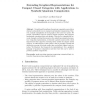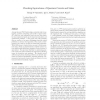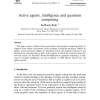508 search results - page 29 / 102 » Quantum Computers |
135
Voted
AISC
2008
Springer
15 years 4 months ago
2008
Springer
Graph-based formalisms of quantum computation provide an abstract and symbolic way to represent and simulate computations. However, manual manipulation of such graphs is slow and e...
127
click to vote
ICCAD
2007
IEEE
15 years 11 months ago
2007
IEEE
Among the post-CMOS technologies currently under investigation, quantum computing (QC) holds a special place. QC offers not only extremely small size and low power, but also expon...
113
Voted
ISCI
2000
15 years 2 months ago
2000
This paper reviews evidence from neuroscience and quantum computing theory in support of the notion of autonomy in the workings of cognitive processes. De
129
click to vote
TCC
2004
Springer
15 years 8 months ago
2004
Springer
Quantum 2-party cryptography differs from its classical counterpart in at least one important way: Given blak-box access to a perfect commitment scheme there exists a secure 1−2...
97
Voted
PPL
2010
15 years 29 days ago
2010
Rank-varying computational complexity describes those computations in which the complexity of executing each step is not a constant, but evolves throughout the computation as a fu...



